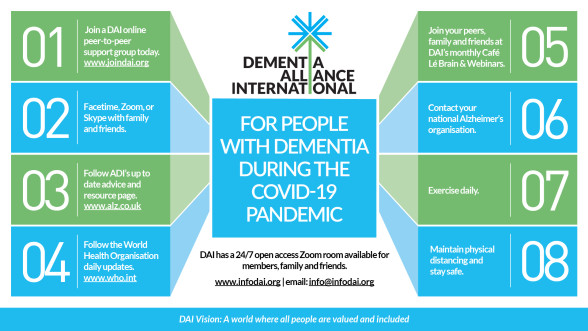During the current COVID-19 pandemic, members of DAI and almost all others are rightfully extremely worried about the impact on their day to day lives of this outbreak, including being able to shop in their communities for the most basic of supplies.
In most countries cinemas, almost all essential services such as restaurants, conference venues, hairdressers, beauty therapists and nail salons have been ordered to close. Physical distancing measures are in place (commonly referred to as social distancing), In some countries, no more than two people can meet in any one group, and they must be 1.5 metres apart.
DAI is providing additional support to DAI members at this difficult time by hosting a number of extra support groups, reported on recently.
If you have demenetia, or know someone who does, please refer them to DAI, or to their local or national Alzheimer's organisation, as many are also now providing online support.
These are extraordinary and extremely stressful and upsetting times for most people, perhaps especially older persons and marginalised groups such as people with dementia, and the information below may be of interest.
It is a challenging time for everyone, and enhances why access to clear, accurate, and up-to-date information is essential.
Alzheimer’ Disease International (ADI)
ADI has recently published a position paper on COVID-19 with members of their Medical and Scientific Panel, which as their strategic partner, our Chair Kate Swaffer was asked to contribute as an author, and provide a quote. The global impact of COVID-19 is unprecedented, particularly on vulnerable groups such as people living with dementia and their families and caregivers. We hope that by sharing such information, we can assist persons and families in making informed decisions about how, when and where to seek help at this difficult time. You can read the full article here...
Within the article, several important topics are addressed:
- Is COVID-19 different for people with dementia?
- Different countries' guidance on how and when to seek further treatment
- Difficult decisions around hospital admission and triage
- Other information on COVID prevention and treatment and additional challenges to consider for people living withdementia
The World Health Organisaton (WHO):
The WHO provides daily updates and many other resources - https://www.who.int/emergencies/diseases/novel-coronavirus-2019 and including a very recently released publication for children - https://www.who.int/news-room/detail/09-04-2020-children-s-story-book-released-to-help-children-and-young-people-cope-with-covid-19
The following is a précis of recently received information from the WHO Working Group webinar on COVID-19 and Non Communicable Diseases (NCDs) webinar:
The United Nations three strategic priorities:
- Contain the spread of the COVID-19 pandemic and decrease morbidity and mortality (WHO SPRP/2)
- Decrease the deterioration of human assets and rights, social cohesion and livelihoods
- Protect, assistant and advocate for refugees, internally displaced people, migrants and host communities particularly vulnerable to the pandemic.
The WHOs three strategic priorities:
- Rapidly establishing international coordination and operational support
- Scaling up country readiness and response operations
- Accelerating priority research and innovation.
Links between COVID-19 and other Non-Communicable Diseases What we know so far:
- People of all ages can be infected by COVID-19.
- The risk of becoming severely ill with the virus appears to increase for people who are 60+.
- People living with NCDs also appear to be more vulnerable to becoming severely ill with the virus, in particular people living with:
- Cardiovascular disease (e.g. hypertension, persons who have had, or are at risk for, a heart attack or stroke)
- Chronic respiratory disease (e.g. COPD)
- Diabetes
- Cancer
- Smokers are likely to be more vulnerable to COVID-19
The International Disability Alliance (IDA) is providing many updates to the disability community, as well as hosting webinars and live Facebook chats. DAI has regular opportunities through the IDA to contribute to policy and publications about disability to ensure people with dementia are included.
Many other orgnaisations are hosting webinars and live Facebook chats; listing them here is difficult as there are simpy too many, and new opportunitiues from different organisations and individuals are emerign every day.
Please contact us if we can assist in any way.
